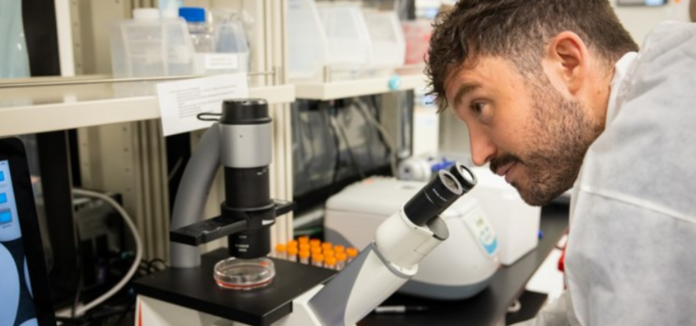Startup aims to make lab-grown human eggs, transforming options for creating families
Conception’s chief scientific officer, Pablo Hurtado, examines very early primordial germ cells under a microscope in a company lab in Berkeley, California.
Laura Morton for NPR
BERKELEY, CALIF. — On a cloudy day on a gritty side street near the shore of San Francisco Bay, a young man answers the door at a low concrete building.
“I’m Matt Krisiloff. Nice to meet you,” says one of the founders of Conception, a biotech startup that is trying to do something audacious: revolutionize the way humans reproduce. “So let me find them real quick,” says Krisiloff as he turns to look for his co-founders, Pablo Hurtado and Bianka Seres, so they can explain Conception’s mission.
“I personally think what we’re doing will probably change many aspects of society as we know it,” says Hurtado, the company’s chief scientific officer. “It’s really exciting to be working on a technology that can change the lives of millions of humans.”
Conception is trying to accelerate, and eventually commercialize, a field of biomedical research known as in vitro gametogenesis (IVG). “Basically, we’re trying to turn a type of stem cell called an induced pluripotent stem cell into a human egg,” Krisiloff says. “[This] really opens the door, if you can create eggs, to be able to help people have children that otherwise don’t have options right now.”
The experimental technology could help women who have lost their eggs to cancer treatment, women who have never been able to produce healthy eggs and women whose eggs are no longer viable because of their age.
IVG would enable these women to have their own genetically related babies at any age. That’s because induced pluripotent stem cells can be made from just a single cell from anyone’s skin or blood. So these lab-grown eggs would have that person’s DNA.
But the possibilities are even broader.
“My personal biggest interest in it is it could allow same-sex couples to be able to have biological children together as well,” Krisiloff says. “Yeah, I’m gay, and it’s something that got me so personally interested in this in the first place.”
Same goes for Hurtado. “There is something intrinsic about sharing a life that is half me and half my husband. I don’t have that capacity right now.” He adds, “I am devoting my life to trying to change that.”
For the rest of this article please go to source link below.

